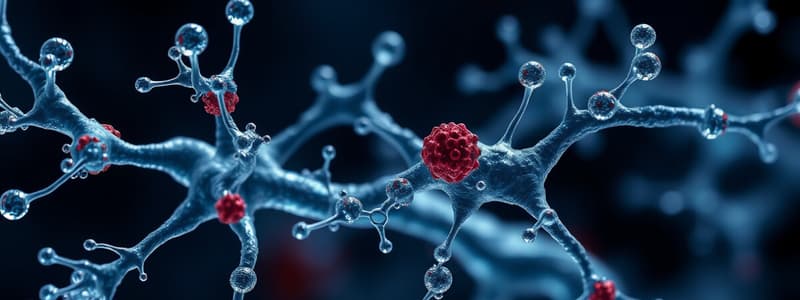Podcast
Questions and Answers
What is the primary role of nitrate in plants?
What is the primary role of nitrate in plants?
- A component of chlorophyll
- A regulator of enzyme activity
- A source of nitrogen for the synthesis of proteins (correct)
- A source of phosphorus for root growth
Which of the following statements accurately describes the function of calcium in animals?
Which of the following statements accurately describes the function of calcium in animals?
- It helps strengthen cell walls
- It is involved in muscle contraction and blood clotting (correct)
- It is a key component of red blood cells
- It enhances digestive enzyme activity
Which inorganic ion is necessary for the synthesis of hemoglobin in animals?
Which inorganic ion is necessary for the synthesis of hemoglobin in animals?
- Iron (correct)
- Calcium
- Magnesium
- Nitrate
What role does magnesium play in both animals and plants?
What role does magnesium play in both animals and plants?
Which of the following best describes the function of phosphate in animals?
Which of the following best describes the function of phosphate in animals?
In plants, which ion is crucial for forming nucleic acids?
In plants, which ion is crucial for forming nucleic acids?
What is NOT a function of iron in animals?
What is NOT a function of iron in animals?
Which of these inorganic ions is involved in strengthening cell walls in plants?
Which of these inorganic ions is involved in strengthening cell walls in plants?
What role does water play in providing support to plant cells?
What role does water play in providing support to plant cells?
Which of the following statements accurately describes the function of pleural fluid?
Which of the following statements accurately describes the function of pleural fluid?
In what way do inorganic ions function in organisms?
In what way do inorganic ions function in organisms?
How does the turgidity of plant cells facilitate the standing upright of seedlings?
How does the turgidity of plant cells facilitate the standing upright of seedlings?
Which property of water contributes to its ability as a lubricant in biological systems?
Which property of water contributes to its ability as a lubricant in biological systems?
What percentage of body weight does water typically constitute in humans?
What percentage of body weight does water typically constitute in humans?
Which of the following is NOT a function of water in organisms?
Which of the following is NOT a function of water in organisms?
In plants, water helps transport inorganic ions predominantly through which process?
In plants, water helps transport inorganic ions predominantly through which process?
Which chemical equation illustrates a process that involves water as a reactant?
Which chemical equation illustrates a process that involves water as a reactant?
What role does water play as a cooling agent in organisms?
What role does water play as a cooling agent in organisms?
Why is the ability of water to dissolve many substances important for organisms?
Why is the ability of water to dissolve many substances important for organisms?
What happens to body temperature when humans produce more sweat?
What happens to body temperature when humans produce more sweat?
What is the main component that contributes about 98% of the body weight in organisms like jellyfish?
What is the main component that contributes about 98% of the body weight in organisms like jellyfish?
Which of the following biomolecules is primarily known for containing both carbon and nitrogen?
Which of the following biomolecules is primarily known for containing both carbon and nitrogen?
What element is a primary component of all major organic substances?
What element is a primary component of all major organic substances?
Which carbohydrate is primarily used as an energy source in cells?
Which carbohydrate is primarily used as an energy source in cells?
What is the role of phospholipids in biological systems?
What is the role of phospholipids in biological systems?
Which of these pairs correctly matches the type of biomolecule with its example?
Which of these pairs correctly matches the type of biomolecule with its example?
Which of the following best describes nucleic acids?
Which of the following best describes nucleic acids?
Which element is NOT a primary constituent of carbohydrates?
Which element is NOT a primary constituent of carbohydrates?
Which characteristic distinguishes biomolecules from inorganic compounds?
Which characteristic distinguishes biomolecules from inorganic compounds?
What is the maximum magnification achievable with light microscopes?
What is the maximum magnification achievable with light microscopes?
Which type of microscope produces a three-dimensional image?
Which type of microscope produces a three-dimensional image?
What color is generally produced by light microscopes?
What color is generally produced by light microscopes?
Which of the following microscopes uses electron beams to form images?
Which of the following microscopes uses electron beams to form images?
What is the primary characteristic of images produced by transmission electron microscopes (TEM)?
What is the primary characteristic of images produced by transmission electron microscopes (TEM)?
What type of image do most electron micrographs in scientific literature appear as due to additional processing?
What type of image do most electron micrographs in scientific literature appear as due to additional processing?
Which microscope offers a maximum magnification of 1,500,000 times?
Which microscope offers a maximum magnification of 1,500,000 times?
What is a significant limitation of light microscopes compared to electron microscopes?
What is a significant limitation of light microscopes compared to electron microscopes?
Flashcards
Water's function in organisms
Water's function in organisms
Water acts as a reactant in chemical reactions, a solvent, a cooling agent, a support for turgidity, and a lubricant.
Nitrate's role
Nitrate's role
Nitrate is a source of nitrogen for protein synthesis in organisms.
Magnesium's function
Magnesium's function
Magnesium activates enzymes and is part of chlorophyll in plants.
Iron's role in blood
Iron's role in blood
Signup and view all the flashcards
Calcium's importance
Calcium's importance
Signup and view all the flashcards
Phosphate's components
Phosphate's components
Signup and view all the flashcards
Main organic substances
Main organic substances
Signup and view all the flashcards
Glucose's role
Glucose's role
Signup and view all the flashcards
Starch's role
Starch's role
Signup and view all the flashcards
Glycogen's role
Glycogen's role
Signup and view all the flashcards
Cellulose's role
Cellulose's role
Signup and view all the flashcards
Light Microscope
Light Microscope
Signup and view all the flashcards
Electron Microscope
Electron Microscope
Signup and view all the flashcards
Scanning Electron Microscope (SEM)
Scanning Electron Microscope (SEM)
Signup and view all the flashcards
Transmission Electron Microscope (TEM)
Transmission Electron Microscope (TEM)
Signup and view all the flashcards
Study Notes
Inorganic Chemical Constituents of Organisms
- Water accounts for about 60% of body weight in humans and even more in organisms like jellyfish.
- Functions of water:
- Acts as a reactant in chemical reactions, e.g., photosynthesis.
- Serves as a medium for dissolving substances and facilitating chemical reactions.
- Functions as a cooling agent by removing heat during evaporation (e.g., sweat).
- Provides support by maintaining turgidity in plant cells, helping seedlings stand upright.
- Major component of lubricating fluids, reducing friction (e.g., pleural fluid in lungs).
Inorganic Ions
- Inorganic ions, often termed minerals, play essential roles in both plants and animals.
- Key inorganic ions and their functions:
- Nitrate: Source of nitrogen for protein synthesis.
- Magnesium: Activates enzymes and is a component of chlorophyll in plants.
- Iron: Essential for forming hemoglobin in red blood cells for oxygen transport.
- Calcium: Key for bone and teeth structure; involved in blood clotting and muscle contraction.
- Phosphate: Component of bones, phospholipids, and nucleic acids (e.g., DNA).
Organic Chemical Constituents of Organisms
- Major organic substances include carbohydrates, lipids, proteins, and nucleic acids, collectively known as biomolecules.
- Carbohydrates are composed of carbon, hydrogen, and oxygen, with common types being:
- Glucose: Main energy source for cellular functions.
- Starch: Energy storage in plants.
- Glycogen: Energy storage in animals.
- Cellulose: Structural component in plant cell walls.
Microscopy Techniques
- Light Microscopes: Uses light to pass through samples, achieving magnifications of up to 1600 times with colored images.
- Electron Microscopes: Utilize electron beams for higher magnifications:
- Scanning Electron Microscopes (SEM): Offer three-dimensional images showing external structures (up to 500,000 times).
- Transmission Electron Microscopes (TEM): Provide two-dimensional images of internal structures (up to 200,000 times).
- Most electron micrographs are in black and white, but false color can be added digitally for better visualization.
Studying That Suits You
Use AI to generate personalized quizzes and flashcards to suit your learning preferences.




